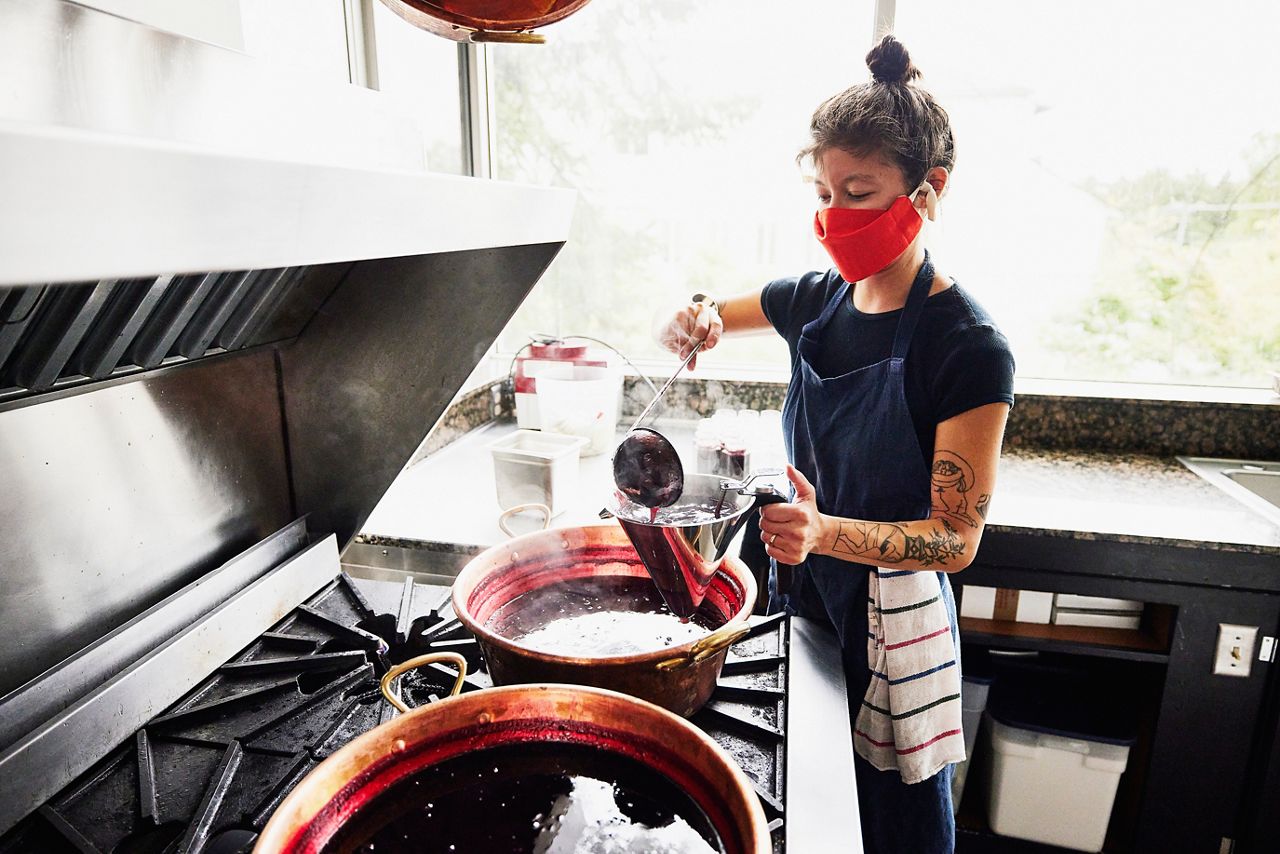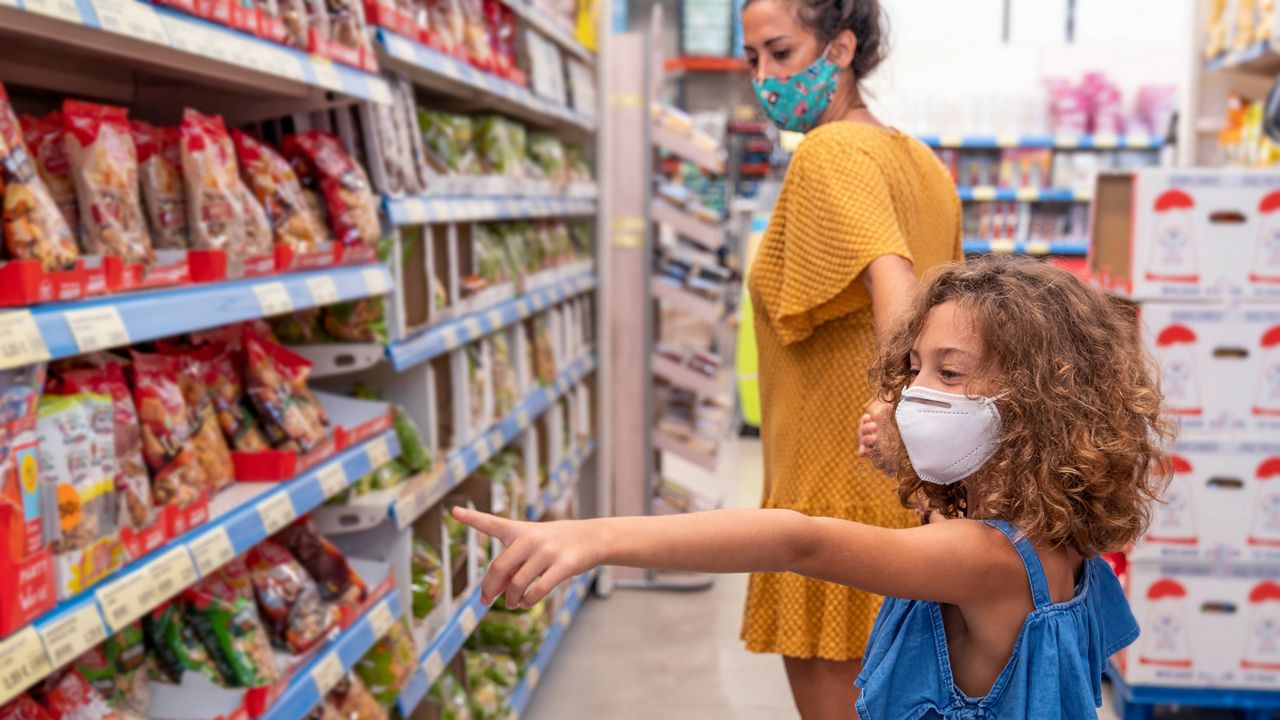On March 26, Hawaii’s indoor mask mandate ended, making the Aloha State the last state in the U.S. to officially drop masks. While the state's mask mandate has ended, certain places like schools, public transportation, hospitals and jails still require people to wear masks, and businesses are free to implement mask wearing requirements for employees or customers. Many Hawaii residents also have their own thoughts on how they will proceed with wearing masks or not.
Locations that still require masks indoors
While the state’s mask mandate for stores ended, the Centers for Disease Control and Prevention still recommends indoor masking for all students 2 years and older, teachers, staff and visitors to K-12 schools, and Hawaii’s Department of Health agrees. Public schools in Hawaii are still requiring indoor masking, although in early March they stopped requiring masks when outdoors.
Some private schools, like Punahou and Kamehameha, still require indoor mask wearing. However, ʻIolani School said they made wearing masks indoors optional after Spring Break on March 28.
"Our high vaccination rate coupled with our weekly pool testing enables us to remain in lockstep with the state's lifting of mask restrictions for interior spaces," ʻIolani School's Director of Communications Michelle Hee told Spectrum News Hawaii.
The University of Hawaii said masks are still required to be worn indoors on their 10 campuses in classrooms, shared laboratories, other tightly confined educational spaces and at sporting venues where the number of attendees is close to maximum capacity.
Chaminade University is requiring everyone on campus to wear a mask indoors until the end of the spring semester. However, Hawaii Pacific University said it no longer requires masking indoors, but it will encourage their use.
Masks are still mandated at hospitals, like Kaiser Permanente Hawaii, Kapiolani Medical Center for Women & Children, and Tripler Army Medical Center, and correctional facilities too.
The CDC also recommends masks continue to be worn on public transportation, and the Transportation Security Administration has extended the directive for mask wearing on public transportation, which includes airplanes and buses, and around transportation hubs until April 18. TheBus and TheHandi-Van have followed suit and still require patrons to don masks.
How Hawaii businesses are handling the new mask rules
Hawaii Theatre, Diamond Head Theatre and Manoa Valley Theatre are still asking patrons to wear masks inside their venues. The Mission Memorial Auditorium, on the Frank F. Fasi Civic Grounds, no longer requires masks indoors.
“However, if your comfort level is still to remain masked in crowded settings, then by all means — you are more than welcome to cover up,” Shirley Amundson, a public information officer for the Mayor’s Office of Culture and the Arts, told Spectrum News about the Mission Memorial Auditorium.
The Manoa House, a wellness space with acupuncture, massage, and other bodywork, has asked people to continue to wear masks during their sessions.
Rick Jones, the manager at Coconut Grove Music in Kailua on Oahu, told Spectrum News Hawaii that they still require masks while shopping in their store. He said they would evaluate the COVID numbers on April 15 and decide at that point whether to make it optional.
“If someone complains, we tell them that an employee has a compromised immune system, and some of us have aged family members,” said Jones. “Most people understand, so no big problems as of yet.”
Zippy’s said it recommends the use of masks when indoors but will no longer require them.
“For our employees, the guidance is the same, except for those staff that have particular food production responsibilities that require the use of face masks, such as at our central commissary kitchen (which was always the case, even before the pandemic),” Vice President of Marketing & Communications at Zippy’s Kevin Yim told Spectrum News Hawaii.
Zippy’s saw a slight increase in business about a month ago when the vaccination mandates on Oahu and Maui ended, but dropping the mask requirements hasn't yet materialized in sales, according to Yim. Windward Mall is no longer making masks mandatory indoors.

“However, Windward Mall encourages its community to do what makes them feel safe and to please respect everyone else’s decision to do the same. Being around other people in public poses a risk of exposure to COVID-19. By visiting Windward Mall, you voluntarily assume that risk,” Cesar Topacio, vice president and senior general manager at Windward Mall, said to Spectrum News Hawaii.
As a result of making indoor masks optional, Topacio said they anticipate an increase in foot traffic throughout the mall, which will generate more businesses for their merchants.
“We look forward to holding more events while keeping the health and safety of Windward Mall’s customers, employees and community a top priority,” Topacio added.
The Director of External Communications at Macy's Lauren Phillips told Spectrum News Hawaii that customers and employees in Hawaii are no longer required to wear masks in their stores.
“As mask mandates are lifted, our customers and colleagues are welcome to continue wearing masks if they choose and we will continue to implement preventative safety protocols,” said Phillips.
T&C Surf Designs made wearing masks in their stores optional.
“We will not be enforcing mask requirements for our employees, but highly recommend that our employees continue mask use when indoors and physical distancing cannot be maintained,” Lani Isherwood, the Marketing Director for T&C Surf Designs, told Spectrum News Hawaii. “The policy allows our customers and staff to decide what option is best for them.”
Isherwood said they have noticed that younger customers mostly choose not to wear masks, while older customers are more cautious and still wear masks.
“We noticed a few customers that have their mask on them, and will put it on when shopping if the store gets crowded,” said Isherwood. “Every day, it seems to be a mixed bag.”
Hawaii residents react to no more mask requirements
Eszter Kreisz, a Hilo resident, told Spectrum News Hawaii that she plans to continue wearing a mask inside supermarkets and crowded stores, since new COVID cases are still occurring on Hawaii Island every day.
Kreisz described herself as “not a paranoid type of person,” but said after she caught COVID at the beginning of the pandemic, she had a breathing issue, which lasted for about two weeks. Her husband also caught COVID and was sick for over a month. She said the experience “scared the bejesus out of me.”
Now, they are both vaccinated; Kreisz said she got two shots, while her husband also got boosted.
“Hopefully, I won’t have to argue with anyone about wearing the mask, as it is my health and my choice,” she added.
Ryan Ozawa, a Miliani resident, told Spectrum News Hawaii that he went to two technology meetups — one outdoors and one indoors — on the day the mask mandate was dropped. He said no one except his 17-year-old son wore a mask, who he described as “resolute on still wearing a mask.”
“The next morning, I had a sore throat and immediately regretted going maskless. Fortunately, it was a false alarm, but I'm keeping my mask on for the foreseeable future,” said Ozawa.
He said his whole family is vaccinated and boosted.
“I have been counting masks over the last few days, with mask wearers quickly becoming the minority. I don't think we'll see them drop to zero, though,” he added.
Antoinette Coelho, a Kalihi resident, told Spectrum News Hawaii that she plans to wear a mask when it’s crowded inside stores. She is fully vaccinated but is still deciding whether to get boosted. As for masks, she said that sweat and fog buildup on her glasses, which makes it hard to see.
Since the mask mandate was lifted, Coelho said she went to Walmart and Sam's Club with her mother. She said she saw a lot of people in both stores wearing masks.
“Those stores are huge and attract crowds, so I figured I would continue wearing a mask in those situations,” Coelho said. “But if it's a small store like a 7-11 that doesn't have a lot of foot traffic and if I wanted to get something quick (like a hot food grab, pay, and go), then I wouldn't wear a mask since it would only take a few minutes.”
Catrina Nesper, who lives on Oahu in Kailua, told Spectrum News Hawaii that she is fully vaccinated and boosted and has not caught COVID. “I’d like to keep it that way,” she said.
“I stocked up on everything on Thursday before the mandate ended to avoid having to be indoors with unmasked strangers or tourists for as long as possible,” Nesper said. She said she feels fortunate to be able to buy produce at the outdoor farmer’s market on Sundays in Kailua.
She said she is motivated to avoid maskless people indoors by her two youngest grandchildren, 2-years-old and 4-years-old, who are still too young to be eligible for a COVID vaccine. She also said her partner cares for his aging father, who is vaccinated, but he “has multiple comorbidities and (he) would likely not do well with a breakthrough infection.”
“Most of all, I want to protect my family and community and not risk being a vector,” she said.
She added she is also concerned about long COVID.
“Masking is such an easy additional layer of protection,” Nesper said. She said everyone in her family has been wearing N95s, even outdoors when there are crowds.
Nesper said she was worried about tourists, especially with the end of Hawaii’s Safe Travels program on March 25.
“Based on the behavior of most tourists running amok in our neighborhood and (at) Kailua Beach after their flights, I feel less protected and will continue to mask for the foreseeable future,” she said.
Michelle Broder Van Dyke covers the Hawaiian Islands for Spectrum News Hawaii.
Editor's note: this story has been revised to correct attribution for Cesar Topacio's quote.



